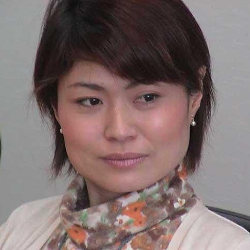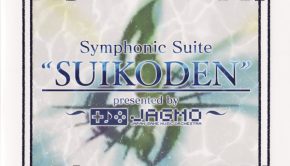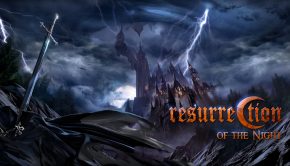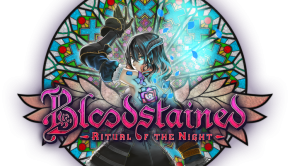Michiru Yamane Profile
 |
Also Known As: 山根ミチル (やまねみちる) / Chiru-Chiru Yamane / Chiruchiru Yamane |
| Date of Birth: April 12, 1965 (Chiba) |
|
| Residence: Tokyo |
|
| Game Works: Castlevania, Sparkster, Elder Gate, Suikoden |
|
| Official Site: English Site |
History
| Organisation | Type | Tenure | Role |
| Konami | Game Developer | 1988 – 2008 | Composer |
| Freelance | N/A | 2008 – | Composer |
| GE-ON-DAN | Artist Collective | 2009 – 2011 | Member |
Biography
Michiru Yamane is a classically-trained freelance composer best known for hercontributions to the Castlevania franchise. Born on September 23, 1963 in Kagawa Prefecture, Yamane learned to play the piano and electone as a child, and soon started trying to compose. During her high school years, she enjoyed a wide range of music, spanning classical artists such as Ravel and Bach, to electronic artists such as Kraftwerk and Yellow Magic Orchestra. Desiring a career as a musician, she subsequently majored in musical composition at the Aichi Prefectural University of Fine Arts and Music. While there, she learned Baroque counterpoint and large-scale orchestration, among other formal disciplines, and was also introduced to computer sequencing of music. Yamane was offered at teaching job at a high school after taking a Masters Degree, but decided she wanted to continue composing. Upon attending a job fair in 1988, she learned that Konami were one of the only companies looking to hire composers. While she didn’t initially intend to become a game composer, the role seemed like an excellent way to compose full-time while earning money. She ended up finding the job so satisfying that she worked there for 20 years.
At Konami, Yamane underwent a period of training as a game composer under employees such as Motoaki Furukawa. She learned a particularly large amount on her debut projects, composing victory fanfares for Track & Field and stage themes for Gradius II Gofer no Yabou Episode II. Her uplifting synth music for the latter was directly inspired by images of the space setting and flighty gameplay. She subsequently became the main composer of the NES’ Ganbare Goemon 2. Aiming to reflect the youthful character and Edo era setting, she pursued a comical Japanese-influenced sound. Feeling restricted by the technical specifications of the console, Yamane took inspiration from Bach on how to produce elegant compositions using minimal parts and also learned about editing PSG samples from her Konami superiors. The artist encountered further technical limitations while penning the scores for the Teenage Mutant Ninja Turtles: Fall of the Foot Clan and the Gradius spinoff Nemesis for the Game Boy. Through meticulous attention to composition and programming, she was still able to preserve the essence of their respective franchise’s music nonetheless. Yamane was also one of a large team of composers asked to contribute to Hideo Kojima’s SD Snatcher in 1990.
Between 1990 and 1992, Michiru Yamane spent several years working in Konami’s arcade division. During her time there, she composed rhythmically compelling scores for diverse beat ‘em ups, ranging from the urban crime-fighting title Vendetta, to the comic book adaptation Astérix, to the westernWild West C.O.W. Boys of Moo Mesa. She also enjoyed penning a soundtrack for another space shooter, Lightning Fighters, with fewer technical restrictions to her Gradius works. However, perhaps her most famous score during this period was for Detana!! Twinbee, a shooter with a more cutesy image than Gradius. She fondly remembers producing some very colourful and fun tunes for this title. While working on this project, she also met producer Koji Igarashi, then a new Konami employee who went on to lead the Castlevania series. The artist went on to serve as a guest contributor on Contra: Hard Corps and take leading roles on the two simultaneously developed versions of Sparkster (aka Rocket Knight Adventures).For the SNES title, she produced poppy and groovy music in line with Sega’s mega-hit approach on Sonic the Hedgehog. She also worked closely with newcomer Akira Yamaoka on the Genesis title, creating sound effects rather than music.
In 1994, Yamane made her Castlevania debut with Castlevania: Bloodlines. For the first time, she was responsible for all composition, sound effects, and sound programming on a project, and demonstrated competence manipulating the Mega Drive&39;s FM sound modules. In contrast to earlier scores in the series, Yamane decided to represent the game’s vampire-infested world using influences from traditional classical music. Some of her experiments in Baroque counterpoint and tone color brought a particularly dark mood to the game’s stages. Nevertheless, she carefully analysed the scores of previous entries in the series – channelling their melodic influences with four classic arrangements and a couple of brand new anthems. Over a two year period, she persevered to score Koji Igarashi’s Castlevania: Symphony of the Night, the most famous and acclaimed title in the series. The transition from Genesis to PlayStation enabled Yamane to broaden the range of her musical expression; she ensured every one of her compositions was intricately crafted, while contrasting the environments of Dracula’s castle. Her other responsibilities included editing voice dialogue and designing realistic sound effects. The glorious reception of her score and its album releases confirmed her status as the lead composer of the series.
Following this magnum opus, Yamane explored new genres as a lead composer on several titles at Konami. She continued to exploit the technological capacity of the PlayStation with her action-packed score for 1999’s Gungage – hybridised her signature symphonic stylings with co-composer Sota Fujimori’s rock and electronic influences to produce an engaging score. The following year, Yamane reunited with Fujimori to score her first traditional RPG score, Elder Gate. Though the composer continued to focus on classical orchestrations, she expressed her musicality in a distinct way to the Castlevania series in order to capture the worldly fantasy setting. Yamane was also asked to compose a handful of tracks for both Suikoden III and Suikoden IV, most notably the 18 minute underscore for the latter’s ending. Her compositions carefully complemented the settings of each game, while retaining the distinctive organic style and lyrical influence of the series’ music. Yamane also received a taste of something different during the summer of 2001, when she was requested to create cinematic opening and ending themes for the fifth and sixth instalments of the soccer series Winning Eleven (adapted as the Pro Evolution Soccer series in the West). These tracks were featured in the series’ compilation album.
Yamane made her long-awaited return to the Castlevania series for its Game Boy Advance adaptations. She had relatively small roles on the externally developed Castlevania: Circle of the Moon, where two of her Bloodlines works were reprised, and Castlevania: Harmony of Dissonance, where she contributed three new tracks. Returning to the lead role on 2003’s Castlevania: Aria of Sorrow thereafter, she persevered to overcome technological limitations once again; offering tracks ranging from haunting Baroque fugues to heroic rock anthems, the soundtrack was as rich and memorable as past instalments. Yamane reserved a more progressive approach for Castlevania: Lament of Innocence, a 3D action adventure for the Xbox and PlayStation 2. As the game was a prequel, the artist felt it would be inappropriate to revisit classic themes or feature a rocking sound. Instead she tried to capture the serious mood and epic scope of the game with tracks ranging from minimalistic ambient drones, to gigantic neo-Baroque setting themes, to aggressive modernist action themes. The score nevertheless included a few more catchy beat-heavy tracks after the game’s direction significantly changed. For the associated album releases, Yamane developed a music collection inspired by the game and four arrangements from Aria of Sorrow.
During 2005, Yamane completed the scores for two simultaneously released Castlevania titles,the DS’ Dawn of Sorrow and the PlayStation 2’s Curse of Darkness. Both scores restored the roots of the series’ music with their heroic melodies and rocking styles. Whereas the former was a classic-styled platformer, the latter was a fully-fledged action adventure. As a result, Yamane hybridised orchestral and rock elements throughout the stage themes, produced a large number of cinematic tracks, and even collaborated with the people’s tenor Russell Watson on the ending theme. In guest roles, Yamane also contributed two action themes for the fighter Rumble Roses, some cinematic themes for the youthful Elebits, and the song “Kamiro Una Mendesu” for beatmania IIDX 14 GOLD. After the completion of Curse of Darkness, Yamane was able to focus on writing the music for the action title OZ. The title featured an electro-orchestral score that contrasted the setting inspired by The Wizard of Oz with the beat ‘em up gameplay. During its development, she began to have some worries as a creator and debated whether to continue her employment at Konami, but resolved to produce a few more scores there.
In 2006, Yamane celebrated the 20th anniversary of the Castlevania series with the DS’ Castlevania: Portrait of Ruin. Collaborating with veteran composer Yuzo Koshiro, she created a well-balanced orchestral score that received a dedicated soundtrack release. The following year, she received the opportunity to polish breakthrough project Castlevania: Symphony of the Night with a new vocal recording and instrumental ending theme for its secret adaptation on the PSP’s Castlevania: The Dracula X Chronicles. Reflecting the global popularity of her music, Yamane also interpreted her Castlevania compositions with surprise organ and cembalo performances at the official Symphonic Game Music Concerts in Leipzig during 2006 and 2007. After such successes, the artist produced her final Castlevania score, the DS’ Castlevania: Order of Ecclesia, in 2008. Under the influence of sound director Yasuhiro Ishihashi, the score took a more upbeat and contemporary approach than its predecessors. However, Yamane still retained the essence of earlier scores with punchy electro-orchestral themes such as the opener. During her final year at the company, she also assisted with the voice editing for Metal Gear Solid 4: Guns of the Patriots, after Kojima’s team required additional help to complete the gigantic game.
In spring 2008, Yamane resolved to depart Konami. After 20 years of working for one company, she desired to slow the pace of her work and have the flexibility of working from home. One of her primary motivations for leaving was apparently her new pet cat. Yamane has nevertheless continued to be active in the industry as a freelancer, partly as a result of maintaining a close relationship with Konami. To commemorate her time on the Castlevania series, she was asked to produce a disc of autobiographical music to conclude the series’ box set. Feeling completely liberated, she recorded compositions and arrangements – in styles spanning classical, acoustic, heavy metal, jazz, and hip-hop – with specialist ensembles. In February 2010, Yamane attended the fan-produced Castlevania – The Concert at Stockholm as a special guest and offered some surprise arrangements and performances on the night. Also recently, she collaborated to produce a gothic operatic theme on Castlevania’s second pachislot adaptation. Also a contributor to the Otomedius shooters, Yamane revisited some of her earliest game compositions (Detana!! Twinbee , Gofer no Yabou Episode II) for Otomedius G and wrote a range of original and DLC-specific background music for Otomedius X.
In the last two years, Yamane has created a variety of music for projects outside Konami. As a remixer, she was entrusted to open GE-ON-DAN’s Guwange Arrange Album – blending traditional Japanese instruments with groovy electronic beats to considerable acclaim – and went on to produce an extended groovy vocal remix on Cave Song Black Label. Yamane further cultivated her relationship with shooter developer Cave as the lead composer of the iPhone’s Mushihimesama Bug Panic; inspired by the precedent of Manabu Namiki’s score, she blended electronic and acoustic tones in an uplifting manner throughout. Continuing to diversify her roles, several Western indie developers asked her to create the stage themes for the fighting game Skullgirls. Feeling inspired by the fast rhythms of the gameplay and the primal style of the graphics, Yamane extensively experimented in jazz stylings and wrote several fusion pieces while working on the soundtrack. She further cultivated her involvement in the indie scene by penning a remix for The Scythian Steppes. Having now found a pace of work that suits her, it is clear that Yamane remains in great demand as a freelancer and she promises to continue surprising her fans with future projects. However, she remains best remembered for her distinctive and emotional scores for the Castlevania series.
References:
– Various Game & Album Credits
– VGMdb Discography
– Official Site (English)
– Interview with GameSpy (English, October 2003, Archived)
– Interview with Game Informer (English, September 2005)
– Interview with Game Music Online (English, February 2010)
– Interview with 1UP (English, June 2010)
© Biography by Chris Greening (September 2007). Last updated on January 20, 2013. Do not republish without formal permission.
Posted on January 20, 2013 by Chris Greening. Last modified on March 21, 2014.














